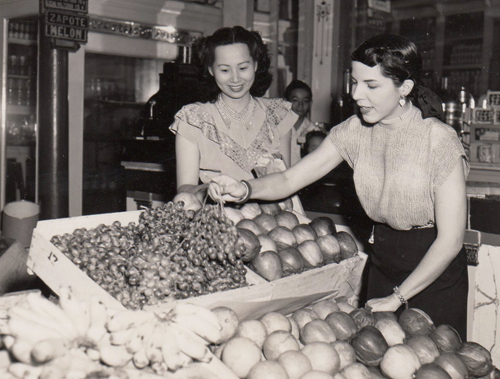By Cindy Domingo
Northwest Asian Weekly

Mercado in Havana
What seemed impossible became a reality last month when President Obama announced the reestablishment of US – Cuba diplomatic relations. This change in foreign policy was monumental given that it has been five decades since these relations were severed.
For me, this announcement was personal and brought meaning to fifteen years of work. I still remember my first trip to Cuba in 1999 when I saw the possibilities of a society that had a different paradigm – a socialist society where the needs of the people came first; where education and healthcare were free and an organized women’s movement pushed forth an agenda that empowered half of their society in such meaningful ways. That trip resulted in over fifteen more trips bringing women and a handful of men to see Cuba themselves and to learn from Cuban experiences and mistakes in building a new society. The Cubans I forged friendships with helped solidify my commitment to change our policy towards Cuba to one of respect for Cuba’s sovereignty and right to self-determination.
Obama’s US-Cuba agreement is accompanied by a prisoner exchange, the opening of embassies in each other’s countries, easing of travel restrictions, easing of financial exchanges and remittances from the US to Cuban nationals, and expanded commerce. Of great importance is President Obama’s instruction to Secretary of State Kerry to initiate a review of Cuba’s designation as a State Sponsor of Terrorism and report on this within six months. Cuba was placed on the list in 1982.
As an Asian American, I have also learned that we share much in common with Cubans. Chinese laborers were brought to Cuba for an eight year contract after the end of African slavery in Cuba because of the need for a new labor force to work in the expanding sugar cane industry. The first Chinese recorded in Cuba was on June 3, 1847 and by 1873, over 130,000 Chinese laborers, mostly from villages in Guangzhou, had been shipped to Cuba. This was a significant number since at that time the island’s total population numbered less than one million. There were also Japanese laborers and Filipinos who came on the Spanish galleon ships, but their communities were of less significant in numbers than the Chinese.
Today, there are probably less than 300 offspring of Chinese immigrants left in Cuba out of the population of 11 million Cubans.
The majority of Cubans of Chinese descent, Chinos, as they are referred to, are of mixed race and in the main no longer speak any Chinese dialects. But over the last two decades, with the opening of relations and trade with China, there has been a renewed interest in the preservation of Chinese culture and language and the institutionalization of the history of Chinese in Cuba. This preservation has been funded both by the Cuban and Chinese governments and has included the hosting of both high level and people-to-people Chinese delegations to Cuba, reestablishment of Chinese festivals, Chinese language school and martial arts classes and stories about the role of Chinese in the Cuban revolution. There are often ceremonies held at the memorial in Havana to honor the Chinese who fought in the first war of Cuban independence against Spain. The inscription of the memorial reads, “There was not one Cuban Chinese deserter, not one Cuban Chinese traitor.”
Recently, I returned to El Barrio Chino in Havana to eat Cuban Chinese food and to revisit the Kwong Wah Po Newspaper, the only Chinese newspaper in Cuba. It had been some years since I first visited and spoke to the employees of this small paper, the only source of news on China for the dwindling number of Chinese Cubans who still read Chinese. It was closed with no signs of whether they were closed for good or closed for repairs. I wondered if Abel Fung Way Man, the manager, was still alive and whether they were still setting the paper by hand – a laborious job since there were thousands of different Chinese characters neatly sorted by character in the large room next to the printing press. But I still remember Man’s last words to us in that visit that remind me so much of the many Cuban people that I have met, “If everyone treated each other like they were in their homes, no matter what country they were in, we would surely have world peace.” I hope that one day we can have a relationship with the Cuban people in that context. That would truly give meaning to the normalization of ties between the US and Cuba. (end)




Thank you for this article. I have not thought about or known about the history of Chinese people in Cuba or the Chinos today. I feel so honored to have traveled to Cuba with the writer of this article and to have learned so much during that trip.